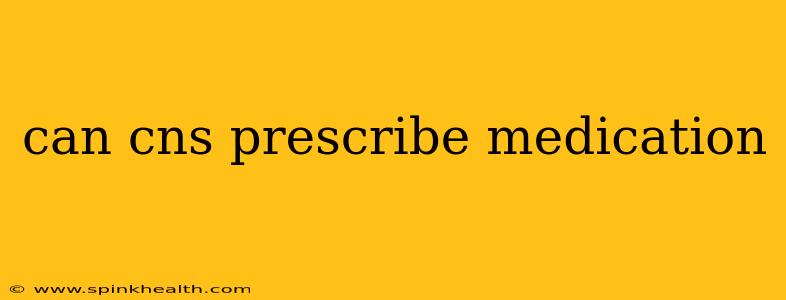Can a CNS Prescribe Medication? Navigating the Complexities of CNS and Prescriptive Authority
The question of whether a CNS can prescribe medication isn't a simple yes or no. It depends entirely on what "CNS" refers to and the specific legal and regulatory framework of the location in question. Let's unpack this.
Most people encountering this question likely mean Certified Nurse Specialist (CNS). However, "CNS" could also refer to other entities, causing ambiguity. To ensure clarity, we'll focus primarily on Certified Nurse Specialists and address related possibilities.
Understanding the Role of a Certified Nurse Specialist (CNS)
Certified Nurse Specialists are advanced practice registered nurses (APRNs) with specialized expertise in a particular area of nursing, such as oncology, cardiology, or pediatrics. Their advanced education and training equip them to provide highly specialized care. Crucially, the ability of a CNS to prescribe medication varies significantly by location.
Can a CNS Prescribe Medication in the US?
In the United States, the authority to prescribe medication for a CNS hinges on state-level laws and regulations. Some states grant full prescriptive authority to CNSs, allowing them to write prescriptions independently. Others might allow prescription writing under collaborative practice agreements (CPAs) with physicians or other licensed healthcare providers. In these agreements, the CNS can prescribe medication but under the supervision or guidance of a physician. Still other states may not grant prescriptive authority to CNSs at all.
To determine whether a CNS can prescribe medication in a specific US state, it's crucial to consult that state's Board of Nursing or relevant regulatory body. Their website will usually provide clear information on prescriptive authority for APRNs, including CNSs.
What About Other Countries?
The laws regarding prescriptive authority for CNSs (or equivalent advanced nursing roles) vary considerably across the globe. In some countries, advanced practice nurses have broader prescriptive authority than in the US, while in others, it's severely restricted or non-existent. Researching the specific regulations of the country in question is vital.
Can Other Professions Using "CNS" Prescribe Medication?
It's important to acknowledge that "CNS" might refer to other professions. While unlikely in the context of prescription authority, it’s worth considering:
- Central Nervous System (CNS) specialists: Neurologists, neurosurgeons, psychiatrists, and other specialists focusing on the central nervous system are medical doctors and absolutely have the authority to prescribe medication. However, the question here is about the nursing role, not the medical specialty.
- Other uses of "CNS": There are other less common uses of the acronym "CNS" that don't relate to healthcare at all.
Factors Influencing Prescriptive Authority
Beyond state-level regulations, several factors can influence whether a CNS can prescribe medication:
- Specialty: A CNS’s area of specialization may impact their prescriptive authority. Some states might grant broader prescriptive rights to CNSs in certain specialties than others.
- Experience: Some states might impose requirements for experience before a CNS can independently prescribe medication.
- Continuing Education: Maintenance of prescriptive authority might require ongoing continuing education credits.
In Conclusion: Always Verify Locally
The ability of a CNS to prescribe medication is a matter of location-specific law. There is no single answer. Anyone needing to know definitively must research the applicable laws in their specific jurisdiction. Always consult the relevant state board of nursing or national healthcare regulatory body to obtain accurate and up-to-date information.

